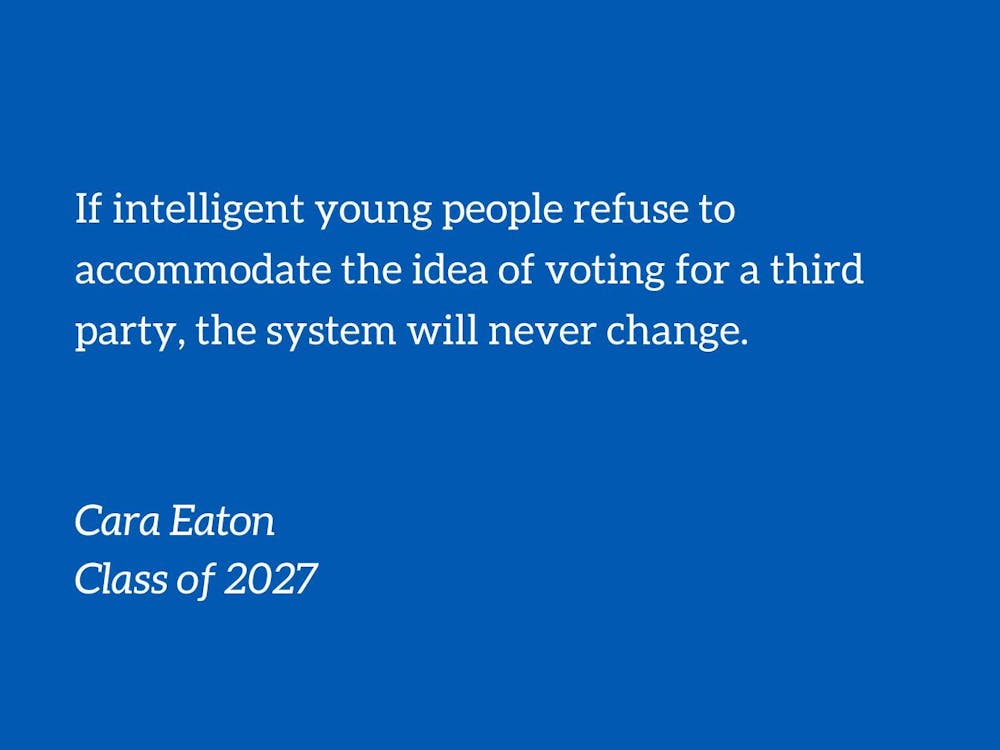Duke is fantastic in mobilizing us to vote. Every day I walk by Bryan Center Plaza, a dedicated group is hawking cookies, stuffed animals and cotton candy to whomever will spare five minutes and fill out the registration form. The students themselves seem to respond in kind. The Duke Votes student group is particularly dedicated, pulling a surprising number of participants dedicated to mobilizing their peers. The partisan groups join them in their mission – the Duke Democrats and Ciceronian Society even co-hosted a debate watch party at the Devil’s Krafthouse for the first presidential debate. The turnout was beyond my imagination. All of this is symptomatic of a politically healthy university.
Duke students want to create voters. And creating voters in one of the most key battleground states is pretty noble.
Yet, for some of us, a perfidious rhetoric lurks behind the casual invitation to vote. Sometimes, when a peer (or a professor!) asks us to vote, it comes with the unspoken double meaning of "You should vote for who I think you should vote for."
Which is why I find myself apologizing and tripping over myself after telling people I was planning to vote for a third-party candidate for president. I don’t like the establishment options. I’m doing it on principle. I know it’s equivalent to throwing away my vote, but...
Feeling like I have to apologize for picking a candidate that is most aligned with my points of view (on war and foreign policy, on individual choice, on criminal justice reform, etc.) just because they’re not an establishment option is depressing. Of course, this is not a Duke-specific issue, but rather an effect of our generation being more polarized than ever. Still, why shouldn’t we have this conversation here at Duke?
There are so many issues on the political front that Duke is willing to accommodate. We don’t hold back from tough conversations. Yet, I haven’t really encountered anyone open and willing to talk about political shame and the effects it can have on a student’s social life. You’re damned if you say you’re voting blue or red in the presence of a deeply seated member of the opposite party. You’re damned if you say you’re voting third party. You’re also damned if you decline to answer or claim that you won’t vote at all (just look at pop star Chappell Roan’s recent initial hesitation to endorse any candidate for president and the hysterics that followed).
This is not to say that everyone is not willing to befriend or even hear out someone who doesn’t share their opinions. But there’s definitely a faction of peers who will not hear you out. They will tell you to vote and then side-eye you when you don’t agree to vote for who they implicitly are asking you to vote for. And humans being self-protectionist creatures, many of us will then simply not speak our mind.
And what a shame that is. Most anyone will criticize establishment politics, and hardly anyone will talk about avenues to change the two-party system. If intelligent young people refuse to accommodate the idea of voting for a third party, the system will never change. That’s the bigger picture, and it’s rather abstract but worth thinking about.
More pertinent to this column are the day-to-day social consequences. College is hard enough without trying to psychoanalyze the political leanings of your conversation partner (a game largely based on stereotypes, anyway), respond in kind and then walk away feeling ashamed on principle of not fully expressing your true opinions. Those brave enough to express their true opinions to the fullest extent don’t often win themselves many friends, except in hyper-specific circles of people with their same opinion. Apologies, but I envision a world where universities are more than these circles.
Sitting outside of the Devil’s Krafthouse, watching the debate and knowing that at least some of the members of the Duke Democrats and the Ciceronian Society worked together to make such an event happen was a sign of hope. Collaboration and amnesty between left- and right-wing students is a fine first step. I hope that this little bit of open-mindedness between whomever involved can spread to localized conversations around campus and extend to people who have radically different or just plain radical ideas about who and what to vote for. I hope we can incentivize voting without the fine print of who to vote for.
Besides, I think you’ll be surprised about what happens if you just let people really speak their truth. Many of the people who have seemingly radical ideas have surprisingly rational justifications. And, hey, even if we don’t leave the conversation convinced, at least we did our part in creating a little connection between two separate circles of thought. At least we’re not complicit in the contagion of political shame.
Enough conversation and free and open thought and we can really change the social and political landscapes of Duke. Wriggle free of your shame in having what you believe to be a less-than-desirable political opinion, show others the same respect and perhaps we can eventually work toward a societal microcosm that represents a new way forward for our generation: a way that abolishes the old establishment conventions and in which we stick to the principles of our word.
Cara Eaton is a Trinity sophomore.
Get The Chronicle straight to your inbox
Signup for our weekly newsletter. Cancel at any time.

